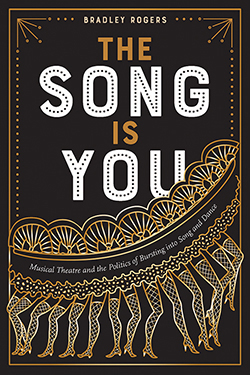Bradley Rogers was an Andrew W. Mellon Postdoctoral Fellow at the JHI from 2010 to 2012, during the themes of Image and Spectacle, and Location/Dislocation. He is a faculty member in the musical theatre program at Goldsmiths, University of London, where he teaches and develops new works of musical theatre. Prior to Goldsmiths, Bradley was an Assistant Professor of Theatre Studies at Duke University and Director of the Duke in London Drama program. He is the author of The Song is You: Musical Theatre and the Politics of Bursting into Song and Dance (University of Iowa Press, 2020).
Bradley provides an overview of the project he worked on while at the JHI and shares what his fellowship experience was like. He also shares why he thinks the humanities are important.
JHI: Can you summarize the project you worked on while at the JHI?

BR:I was selected as part of a group of scholars working on “image and spectacle.” My project focused on the aesthetic form of musical theatre, which punctuates conventional scenes of dialogue with ecstatic moments of spectacular excess. My question was where this form came from—and what its political implications were. I discovered, in part through my work at the JHI, that the genre is haunted by its roots in burlesque and blackface minstrelsy, and that its politics even today are related to its emergence from those regressive 19th-century entertainments. My work at the Jackman ultimately led to my book, The Song Is You: Musical Theatre and the Politics of Bursting into Song and Dance.
JHI: What was your JHI experience like?
BR:The two most intellectually satisfying years I could imagine. I had just graduated from an interdisciplinary graduate program, which was academically very edifying, but it also left me with a lot of lingering (and disparate) academic threads that I was trying to explore and connect. My two years at the JHI gave me the time to follow many of those threads until I saw how I could integrate them—or not—into my own work, without the existential terror of the job market or the tenure clock.
I am so grateful to have had a community of scholars interested in my work. We had a reading group on spectacle, and some of the ideas that we explored together had an enormous influence on me. I had coffee once with Alan Bewell, a professor in the English department, and he posed a casual question to me that ended up reframing my project entirely. In a sense, that one question over coffee at Mercurio led to the work I would pursue over the next five years of my life. Kim was invariably helpful and insightful in navigating the teaching responsibilities that came with my fellowship—and she introduced me to one of the most remarkable spaces I’ve ever encountered in my life: the temple of knowledge that is the Fisher Library.
At the same time, though, the real power of interdisciplinary institutes is somehow ineffable. I was surrounded for those two years by exceptionally smart people—faculty, the staff, postdocs, graduate students, undergraduate students, and visiting scholars. There is something akin to osmosis that makes those places so remarkable. Yes, the scholarly conversations that you have about your own work are essential – but the real joy and the real learning, for me at least, comes in learning how each person approaches their own thing. Somehow, deep down, you assimilate a lot of that, and as it accumulates, you become a better scholar.
JHI: Did participating in the Fellows' Lunch or general interaction with other Fellows spark or inform your research/creativity once you left and if so, how?
BR: More than anything, the Fellows Lunch taught me how to structure a meaningful and productive interdisciplinary environment. Robert Gibbs, who was then the director, paid such careful attention to our presentations and always crafted the best questions—regardless of the discipline, geographic area, time period, or highbrow/lowbrow nature of our interests. Bob’s unflagging curiosity and investment remain the gold standard for me.
JHI: What are you doing/working on now?
BR: I’m a faculty member in the musical theatre program at Goldsmiths, University of London, where I teach history and theory courses, while also helping to develop new works of musical theatre.
JHI: Why do you think the humanities are important?
BR: The humanities seek to understand how humans create and make sense of the world, and through that to create understanding between people and across divides of time and space. Our current moment could provide no greater example of the urgency of the humanities. The world often operates under the dangerous illusion that scientific knowledge alone is valid, and that it alone can save humanity. However, the pandemic has shown that even when science can deliver on its most extraordinary and lifesaving potential, it reaches a limit because it cannot solve a problem that is humanistic in nature: how to help people understand the nature of scientific knowledge in the context of the world in which they live. Only humanistic approaches can start to piece together how we arrived at this epistemologically perverse point, and how we can pull ourselves out.
JHI: How can humanities institutes like the JHI advocate for higher education?
BR: While university endowments skyrocket, the humanities are in an increasingly precarious position. The corporate ethos prevalent in universities today generates absurd expectations regarding “productivity” that are counterproductive and fundamentally anti-intellectual. Humanities work of all kinds—and especially work that is truly interdisciplinary in nature—is necessarily slow and circuitous. Humanities institutes must advocate for the uniqueness of humanities work within the context of higher education in general.
JHI: Anything else you’d like to add?
BR: Monica and Cheryl are the heart of the JHI. Their endless warmth and hospitality made moving—to the 10th floor, to U of T, and to Canada—a total joy. I shared many laughs with them, and I miss them to this day.


